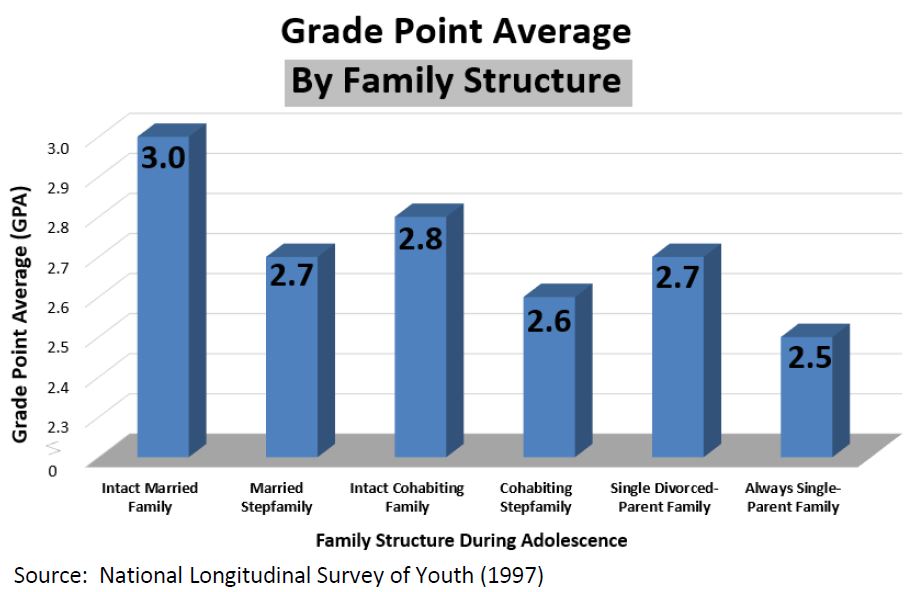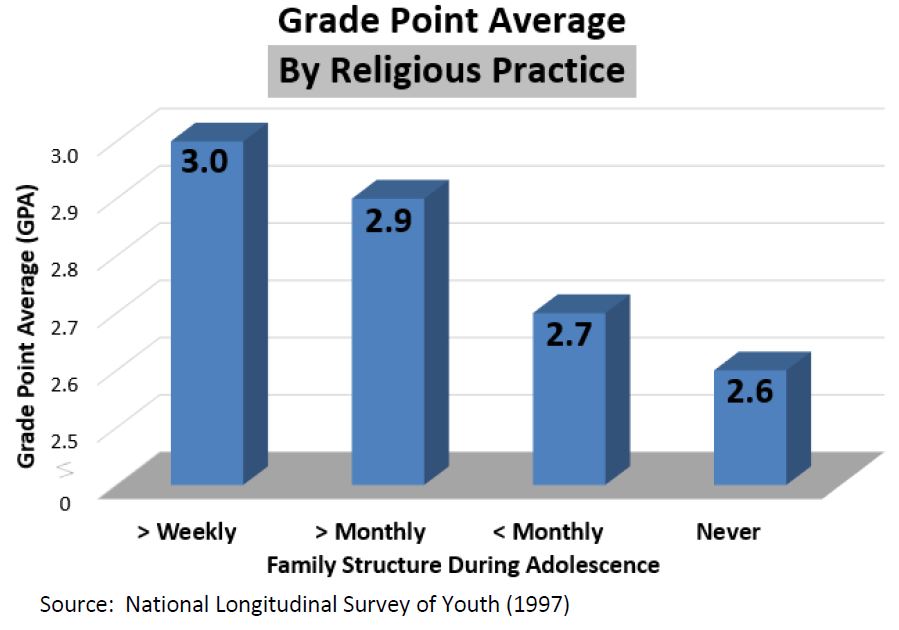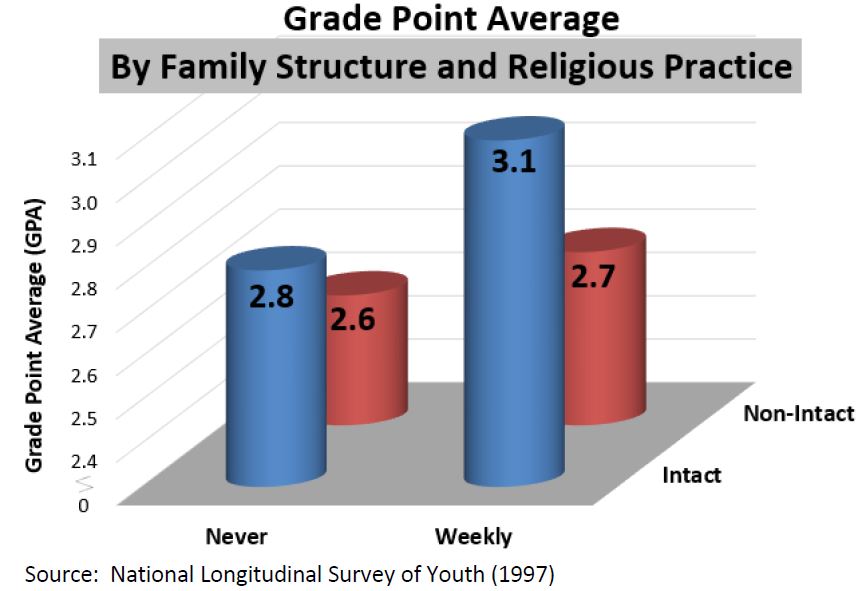Click Here to download “Grade Point Average by Family Structure and Religious Practice”
Grade Point Average by Family Structure and Religious Practice
The 1997 National Longitudinal Survey of Youth shows that students who grew up in an intact married family and currently worship at least weekly have higher Grade Point Averages (GPAs) than other students. [1] Family Structure: Students from married, always-intact families had an average GPA of 3.0. Students from intact cohabiting families (2.8), married stepfamilies and divorced single-parent families (2.7), cohabiting stepfamilies (2.6), and always-single parent families (2.5) had lower average GPAs than students from always-intact families. Religious Practice: Students who attended religious services at least weekly had an average GPA of 3.0. Those who attended at least monthly (2.9), those who attended less than monthly (2.7), and those who never attended religious services (2.6) had lower average GPAs than students who attended at least weekly.
Religious Practice: Students who attended religious services at least weekly had an average GPA of 3.0. Those who attended at least monthly (2.9), those who attended less than monthly (2.7), and those who never attended religious services (2.6) had lower average GPAs than students who attended at least weekly.
 Family Structure and Religious Practice Combined: Students from always-intact married families who attended religious services at least weekly had an average GPA of 3.1. Students from always-intact married families who never attended religious services had an average GPA of 2.8, and students from all other family structures who attended religious services at least weekly had an average GPA of 2.7. Students from all other family structures who never attended religious services had the lowest average GPA (2.6).
Family Structure and Religious Practice Combined: Students from always-intact married families who attended religious services at least weekly had an average GPA of 3.1. Students from always-intact married families who never attended religious services had an average GPA of 2.8, and students from all other family structures who attended religious services at least weekly had an average GPA of 2.7. Students from all other family structures who never attended religious services had the lowest average GPA (2.6).
 Related Insights from Other Studies: A study by Alan R. King of the University of North Dakota found a number of correlations between family and personal religiosity and academic performance. King writes that “unexpressive and conflicted family environments which lack in cohesion and moral emphasis are particularly troublesome to high school performance.”[2] He also found that students whose families are very morally and religiously strong are two thirds less likely to skip class frequently in college.[3]
A study of students at elite U.S. colleges (including Columbia University, Princeton University, Stanford University, University of Pennsylvania, and Yale University) found after controlling for class, race, family background, and gender that religiosity influenced college achievement. Students who attended religious services at least weekly during their final year of high school had higher grades in college than students who did not attend religious services regularly.[4]
[1] These charts draw on data collected by the National Longitudinal Survey of Youth (1997).
[2] Alan R. King, “Family Environment Scale Predictors of Academic Performance,” Psychological Reports 83 (1998): 1325.
[3] Alan R. King, “Family Environment Scale Predictors of Academic Performance,” Psychological Reports 83 (1998): 1326.
[4] Margarita Mooney, “Religion, College Grades, and Satisfaction among Students at Elite Colleges and Universities,” Sociology of Religion 71.2 (2010): 210.
]]>
Related Insights from Other Studies: A study by Alan R. King of the University of North Dakota found a number of correlations between family and personal religiosity and academic performance. King writes that “unexpressive and conflicted family environments which lack in cohesion and moral emphasis are particularly troublesome to high school performance.”[2] He also found that students whose families are very morally and religiously strong are two thirds less likely to skip class frequently in college.[3]
A study of students at elite U.S. colleges (including Columbia University, Princeton University, Stanford University, University of Pennsylvania, and Yale University) found after controlling for class, race, family background, and gender that religiosity influenced college achievement. Students who attended religious services at least weekly during their final year of high school had higher grades in college than students who did not attend religious services regularly.[4]
[1] These charts draw on data collected by the National Longitudinal Survey of Youth (1997).
[2] Alan R. King, “Family Environment Scale Predictors of Academic Performance,” Psychological Reports 83 (1998): 1325.
[3] Alan R. King, “Family Environment Scale Predictors of Academic Performance,” Psychological Reports 83 (1998): 1326.
[4] Margarita Mooney, “Religion, College Grades, and Satisfaction among Students at Elite Colleges and Universities,” Sociology of Religion 71.2 (2010): 210.
]]>
